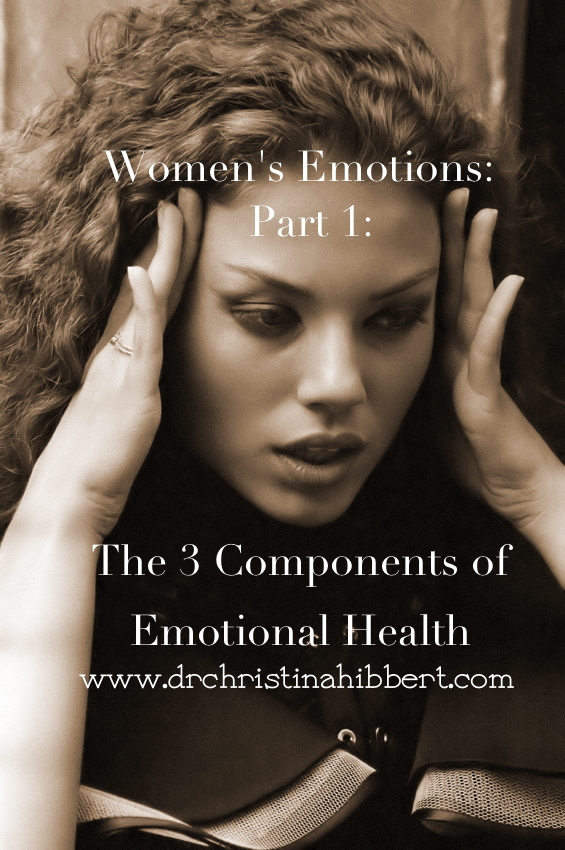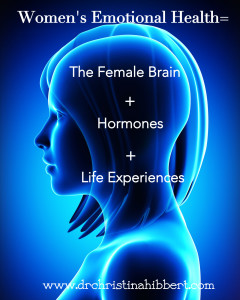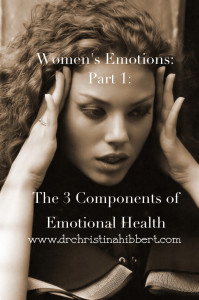
10 Apr Women’s Emotions: Part 1, The 3 Components of Emotional Health
Women’s Emotions: Part 1
The 3 Components of Emotional Health
Years back, when I was in graduate school, I sat in my therapist’s office (yes, I’ve been in therapy; every good psychologist has!) and asked her, “Why am I so complicated?” I’d been frustrated by my constantly shifting emotions, and comparing myself to my even-keel husband only made me feel worse! I was already a wife, mother, and college graduate—shouldn’t I have known by then how to understand my own moods?
My psychologist didn’t have the answers either but she did reassure me. “You’re not complicated,” she explained. “You’re complex.” Over the years I learned that she was right—I’m not as “complicated” as I believed, but my thoughts and emotions can seem pretty “complex” at times. In fact, if you’re anything like me, you might have times when your “complexity” feels downright “crazy”. Can anyone relate?
It’s true that female emotional health is, overall, pretty complex. But at the core level, our overall sense of well-being is actually created out of a simple relationship between three complex components: life stress, the brain, and hormones. Today I hope to shed a little light on these three components of emotional health.
1) Life Stress & Experiences:
Research shows that women have much higher rates of life stress than men, overall, including poverty, domestic violence, and  caretaking responsibilities¹. We all know the emotional toll that stress can take but did you know that your life experiences also have an impact on your brain chemistry? Male or female, every trauma, loss, or hurt we go through alters the chemistry of the brain so that we literally have a different brain today than we had years, or even a year, ago.
caretaking responsibilities¹. We all know the emotional toll that stress can take but did you know that your life experiences also have an impact on your brain chemistry? Male or female, every trauma, loss, or hurt we go through alters the chemistry of the brain so that we literally have a different brain today than we had years, or even a year, ago.
2) The Female Brain:
Your brain is the core of your emotions. This is true for men and women. Emotion originates in the area of the brain called the limbic system and is monitored and regulated by the front of the brain, called the cortex. I did my last internship in neuropsychology, studying the brain, and let me tell you: the brain, in general, is incredible. But the female brain is simply fascinating. Research shows that even as babies females are wired for empathy, hearing others, being heard, observation and reading emotion². In other words, females are born for connection. This makes us want to get to know, nurture, tend, and love others and is arguably one of the best qualities of women overall.
But it’s that same caring nature that can contribute to the higher rates of life stress in women: we simply take on too much and don’t give ourselves a break. When the brain is loaded with stress it begins to look like a seesaw with both ends weighed down. If we continue to load both sides that seesaw will eventually snap! and we will experience depression, anxiety, or just plain burnout. This is called allostatic loading and it happens all the time because we simply don’t do a very good job of taking care of our brains. Understanding the link between life stress and the brain can give us the motivation we need to care for our precious emotional core.
3) Hormones:
Your hormones are directly linked to your brain chemistry. Estrogen is, in fact, a pre-curser to the neurotransmitters, like Seratonin, in your brain that make you feel “well”. Estrogen helps maintain a steady flow of serotonin; too little serotonin leads to depression. When the menstrual cycle comes along—with an increase in estrogen the first two weeks followed by a drop on day 14, and another drop the week before your period—these shifts in estrogen produce changes in the brain that can create symptoms similar to depression or anxiety³. And some women are more sensitive to shifts in hormones than others.
Learning about these three components, it finally all made sense to me. My brain is the core of my emotions; my life stressors affect my brain; changes in hormones also affect my brain and can cause even more life stress. “Why didn’t anyone ever tell me this?” kept repeating in my mind. Understanding the three components of female emotional health opens the door to minimizing stress, caring for our precious brains, and giving ourselves a break the couple of times a month when all three components are scheming against us.
This is just the beginning to understanding our own emotional health, but I hope it helps you see there’s more to your emotions than meets the eye. The more we learn about the fascinating female brain and body, the greater the opportunity to taking charge of our emotional health. The more we heed the wisdom that our bodies hold, the more we can appreciate the complexity, simplicity, and fascination of being a female.
 Can you relate to feeling “complicated” or “complex”? Did you know these things about your body and brain? What have you learned that has helped you manage your emotional health better? Leave us a comment and share!
Can you relate to feeling “complicated” or “complex”? Did you know these things about your body and brain? What have you learned that has helped you manage your emotional health better? Leave us a comment and share!
Also, subscribe to my newsletter (see form above, right) and “like” me on Facebook to learn more about this topic in my continuing series, “Women’s Emotions”!
¹American Psychiatric Association. (2009). Women’s Mental Health Issue Paper.
²Brizendine, L. (2006). The Female Brain. Broadway Books; New York, NY.
³Sichel, D. & Driscoll, J.W. (1999). Women’s Moods: What every woman must know about hormones, the brain, and emotional health. Harper Collins, New York, NY.

[…] you haven’t had a chance to read the Introduction and Part 1 yet, you may choose to do so, because today we will be building upon the basics explained in the […]
[…] dialogue between your brain and your ovaries”[1]. Notice that word—brain. If you recall, from Part 1 of this series, emotional health is a combination of one’s brain, hormones, and life experiences. […]
[…] During pregnancy, hormone levels are at an all-time high—30 times greater than normal. Hormones such as estrogen are actually precursers to the neurotransmitters in the brain that make us feel “normal”. Thus, when our hormones shift, the neurotransmitters shift, and our emotions shift too. For some women, pregnancy hormones can be protective, improving emotional stability and mood. But for many other women the shifts in hormones make them weepy one moment, elated the next, feeling frustrated and wondering, “What is going on with me?” (For more on hormones and the brain, read the “Women’s Emotions” series, […]
I am finding that there is a some correlation between a woman emotional health and her brain. I’ve noticed that several weeks before my period I deal with so many changes and my life stress only add to that.
Absolutely, Michela. The stress impacts the brain, and the brain is essentially in charge of our mental health. Taking care of our brain (reducing stress, getting enough sleep, proper nutrition, and exercise, etc) is key to an emotionally healthy life. 🙂
I know I am complex and not crazy. I have great months and bad months and during those bad months I dump my boyfriend. I try my very best to rest during the last 2 weeks of my cycle and it can work out great and the days when I let my Kali/Fire out I know that I am not a 100% in control. Those fire days that’s when I need more touch, words of affirmation, more sex, more attention and I’m just like a baby who needs LOVE. If only one could take a week off to pamper themselves 🙂
I know I’m complex and never crazy. I find that when one person calls another person crazy it dishonours that person’s feelings.
I have months (cycles) that go smoothly and no hiccups and I have months where out of no where I am suddenly hit by a truck of emotions and confusion and I end up dumping my lovers.Yes I incorporate exercise, nutritious food, sex, touch and connection into my life as often as I can and the days when I do PMS and there’s no where else to place my emotions but to leave the poor person in front me as a witness . I then have to go within and ask myself : ” What is this situation reflecting back at me? Why am I angry, sad, confused? What do I need now?”
What I’ve also noticed is that a lot of women feel SHAME and GUILT when their Kali/Fire.Anger consumes them like they are in the eye of a hurricane. Instead of shame and guilt rather send your body messages of love, Love her fiercely especially your womb! There’s nothing as depleting as shame and guilt. Take time to pamper yourselves and bring out the girl in you and draw or play in water or just watch cartoons or cuddle 🙂 That downtime is all you need to spring forth into your next cycle. Honour your FEELINGs and listen to your BODY.